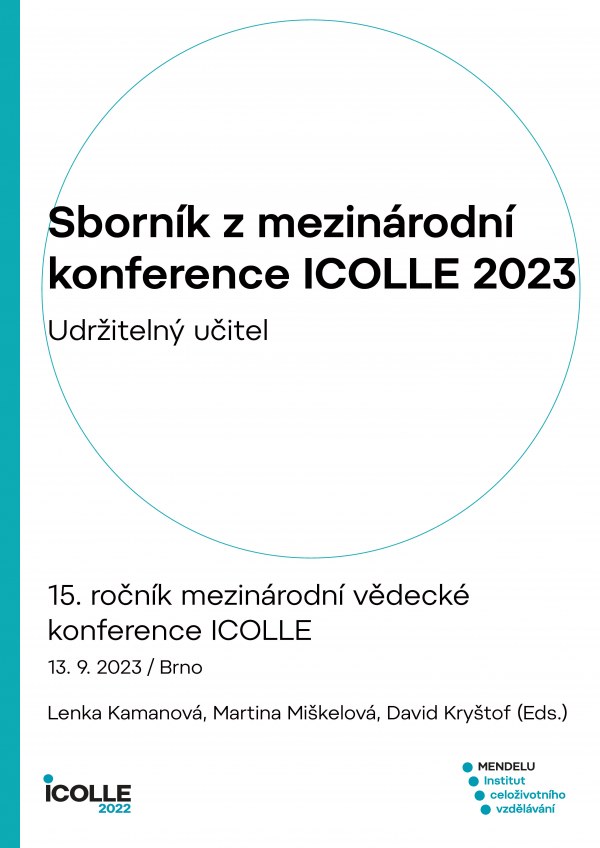
DOI: 10.11118/978-80-7509-958-7-0150
UDRŽITELNOST FUNKCE ŘEDITELE STŘEDNÍ ŠKOLY V KONTEXTU VZNIKAJÍCÍHO STŘEDNÍHO ČLÁNKU V ŘÍZENÍ VZDĚLÁVÁNÍ
- Eva Urbanová
The principal of a secondary school should first and foremost be the leader of the educational process. In the Czech Republic, the headmaster performs many roles, which is made possible by the high autonomy of schools, thanks to which the headmaster implements the concept of school development in various areas (pedagogical, personnel, material, financial). Is his function sustainable if he has to engage in activities that, although not directly related to the management of the pedagogical process, have a great influence on it? Without facilities supporting the healthy physical and mental development of pupils, the school would not fulfil its ecological function; without quality teachers, the school could not be of good quality and fulfil its economic function; without the implementation of the principles of the state’s educational policy, it could not fulfil its political function, etc. The headmaster of a secondary school must continuously develop the competencies to manage the school, but some of them must be delegated in order to be able to focus on the key ones. The Middle Layer in Educational Governance as a current education policy issue could be a solution. The aim of this paper is to find out, based on a questionnaire survey conducted among 240 secondary school principals in the Czech Republic, which activities can be delegated in order to be able to devote himself to key school management activities and to make his function sustainable within his term of office. Research question: Which activities of a secondary school principal can be delegated so that the sustainability of the principal’s position is not compromised by activities that may be performed by others?
Keywords: school principal, secondary school, competence, sustainability, middle layer in educational governance
pages: 150-163, online: 2023
References
- Armstrong, M. (2007). Řízení lidských zdrojů: nejnovější trendy a postupy: 10. vydání. Praha: Grada.
- Beatriz, P., Deborah, N., & Hunter, M. (2008). Improving School Leadership: Policy and Practice. Paris: Organisation for Economic Cooperation and Development. OECD publishing.
- Bush, T. (2005). Theories of Educational Leadership and Management. Sage Publication, London.
 Go to original source...
Go to original source... - Černý, J. (2022). Přetížení ředitelé. Kdo by je měl odbřemenit? Pedagogická orientace, 32(1), 5-32.
 Go to original source...
Go to original source... - ČŠI (2022). Kvalita a efektivita vzdělávání a vzdělávací soustavy ve školním roce 2021/2022. Výroční zpráva České školní inspekce. Dostupné z: https://www.csicr.cz/CSICR/media/Prilohy/ 2022_p%c5%99%c3%adlohy/Dokumenty/Vyrocni-zprava_2021_2022_everze.pdf.
- Edoun, E. I. (2011). Management Leadership and Governance in Education. Proceedings of the 7th European Conference on Management Leadership and Governance. 129-135.
- Federičová, M. (2019). Mezinárodní srovnání ředitelů škol: České administrativní inferno. Praha: Národohospodářský ústav AV ČR.
- Fluckiger, B., Lovett, S., & Dempster, N. (2014). Judging the Quality of School Leadership Learning Programmes: An International Search. Professional development in Education, 40(4), 561-575. http://doi.org/10.1080/19415257.2014.902861.
 Go to original source...
Go to original source... - Fotr, J., et al. (2020). Tvorba strategie a strategické plánování: teorie a praxe. 2., aktualizované a doplněné vydání. Praha: Grada Publishing.
- Fryč, J., Matušková, Z., Katzová, P., Kovář, K., Beran, J., Valachová, I., et al. (2020). Strategie vzdělávací politiky České republiky do roku 2030+. Praha: Ministerstvo školství, mládeže a tělovýchovy.
- Galiani, S., Gertler, P., & Schargrodsky, E. (2008). School Decentralization: Helping the Good get Better, but Leaving the Poor Behind. Journal of Public Economics, 92(10-11), 2106-2120.
 Go to original source...
Go to original source... - Greany, T. (2022). Place-based Governance and Leadership in Decentralised School Systems: Evidence from England. Journal of Education Policy, 1-22. https://doi.org/10.1080/02680939.2020.1792554.
 Go to original source...
Go to original source... - Hanzelka, M. (2009). Řízení školy: ...: výklad je zpracován k právnímu stavu ke dni ... Praha: ASPI. Meritum (ASPI).
- Hargreaves, A., & Shirley, D. (2020). Leading from the Middle: Its Nature, Origins and Importance. Journal of Professional Capital and Community, 5(1), 92-114.
 Go to original source...
Go to original source... - Hřebecký, M. (2021). Odkud a proč se vzala myšlenka středního článku. Řízení školy, 18(4), 12-14.
- Kociánová, R. (2010). Personální činnosti a metody personální práce. Praha: Grada. Psyché (Grada).
- Leithwood, K. (2001). School Leadership in the Context of Accountability Policies. Journal of Leadership in Education, 4(3), 217-235.
 Go to original source...
Go to original source... - Leithwood, K., Harris, A., & Hopkins, D. (2008). Seven Strong Claims about Successful School Leadership. School Leadership and Management, 28(1), 27-42. https://doi.org/10.1080/13632430701800060.
 Go to original source...
Go to original source... - Malere, A., & Ozola, A. (2019). Role of School Principals in High Achievement of Students. In Rural Environment. Education. Personality (REEP). Proceedings of the International Scientific Conference. Volume 12, 10-11 May 2019, Jelgava, Latvia (pp. 83-93). https://doi.org/10.22616/REEP.2019.011.
 Go to original source...
Go to original source... - Mourshed, M., Chinezi, Ch., & Barber, M. (2010). How the World's Most Improved School Systems Keep Getting Better. McKinsey & Company, London.
- Nařízení Evropského parlamentu a Rady (EU) 2016/679 ze dne 27. dubna 2016 o ochraně fyzických osob v souvislosti se zpracováním osobních údajů a o volném pohybu těchto údajů a o zrušení směrnice 95/46/ES (Obecné nařízení o ochraně osobních údajů) (2023). Dostupné z: https://eur-lex.europa.eu/legal-content/CS/ALL/?uri=celex%3A32016R0679.
- Nařízení vlády č. 222/2010 Sb., o katalogu prací ve veřejných službách a správě, ve znění pozdějších předpisů (2023). Dostupné z: https://www.aspi.cz/products/lawText/1/71458/ 1/2?rem=.%20222/2010.
- Nařízení vlády č. 341/2017 Sb., o platových poměrech zaměstnanců ve veřejných službách a správě, ve znění pozdějších předpisů (2023). Dostupné z: https://www.aspi.cz/products/ lawText/1/89167/1/2.
- Park, V., & Datnow, A. (2022). Principals' Emotions in School Improvement: The Role of People, Practices, Policies, and Patterns. School Leadership & Management, 1-19.
 Go to original source...
Go to original source... - Paulovčáková, L. (2015). Marketing: přístup k marketingovému řízení. Vydání I. Praha: Univerzita Jana Amose Komenského.
- Pol, M. (2007). Škola v proměnách. Brno: Masarykova univerzita.
- Pont, B., Moorman, H., & Nusche, D. (2008). Improving School Leadership: Policy and Practice. Paris: OECD.
- Průcha, J. & Veteška, J. (2014). Andragogický slovník. 2., aktualiz. a rozš. vyd. Praha: Grada.


